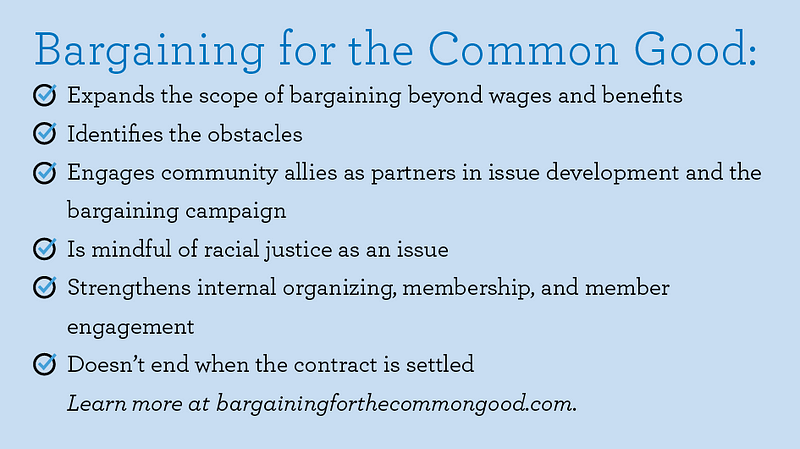Bargaining for the Common Good
Many locals are making the clear connection between what’s good for education and what’s good for the community

Earlier this year, former New York Times labor and workplace reporter Steven Greenhouse wrote in a Washington Post opinion piece about the teacher strikes in Arizona, North Carolina, Oklahoma, and West Virginia and the hotel workers’ strikes around the country: “Recognizing that unions are often isolated and under attack, those that struck went to unusual lengths to win strong community support, framing their demands with an eye to maximizing public backing,” Greenhouse wrote. “The L.A. teachers trumpeted their embrace of a new, community-minded strategy called bargaining for the common good — negotiating to help the students and the schools, and not just to improve the workers’ wages, benefits and working conditions.”
Community groups and public sector unions are joining together, going on offense, and “bargaining for the common good.”www.bargainingforthecommongood.org
That’s the strategy many local education unions across the country and state are using as they move to the bargaining table after a season focused on activism. Bargaining for the common good means aligning workers’ interests with those of the greater community — what’s good for educators is good for the community. That means well-informed educators and well-planned strategic contract campaigns — ones supported by strong visibility and better outreach to the community so stakeholders understand educators’ issues and how those issues may affect them. And it means more voices at county commission and school board meetings and town halls to share stories and, importantly, discover shared values.
The overall number of strikes by American labor unions has declined sharply decade by decade, an unmistakable measure…www.washingtonpost.com
With educators backed by stronger baseline support from the community for what schools and students need, powerbrokers find themselves on call to respond to that community when negotiating educators’ contracts. Citizens today are tuned in and well informed. They are watching what’s happening and they’re responding with their own activism. It’s the perfect time to bring them on board in the fight for a better future for Maryland’s children, families, and communities.

